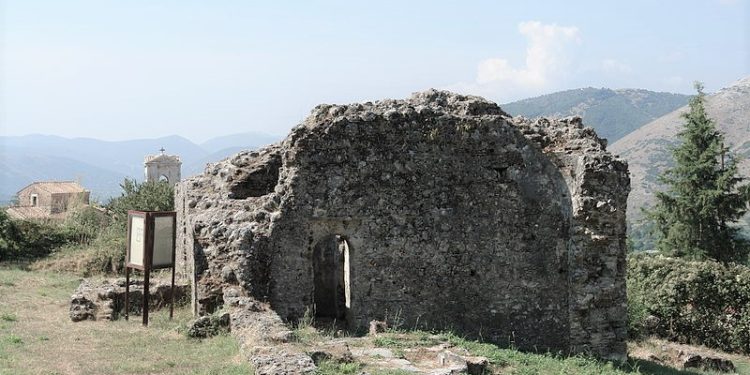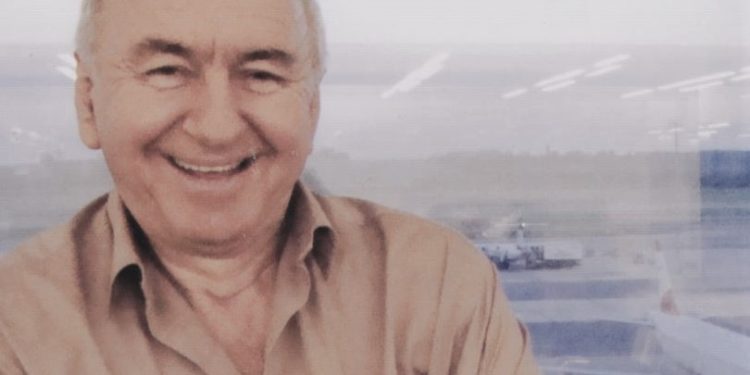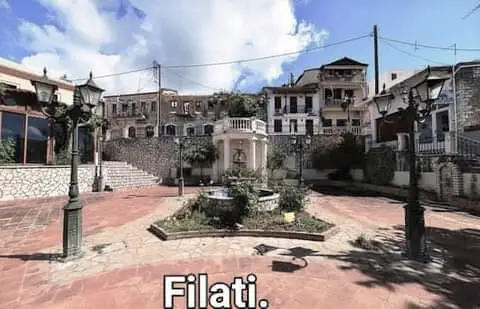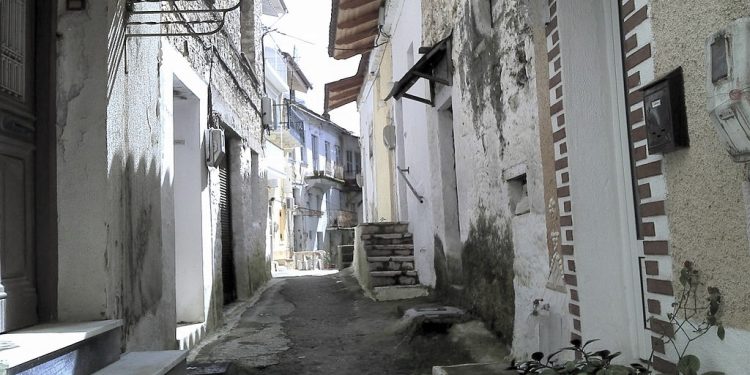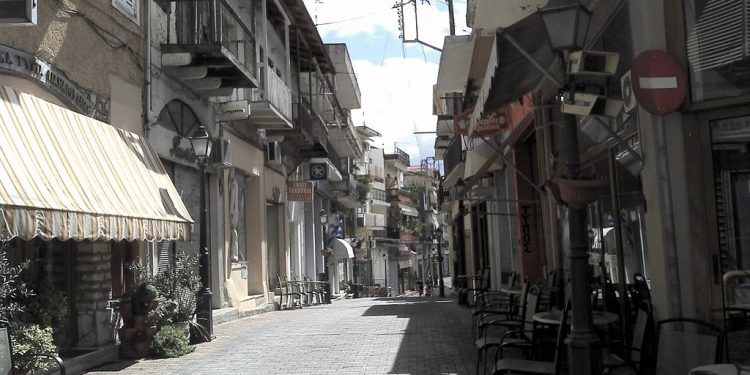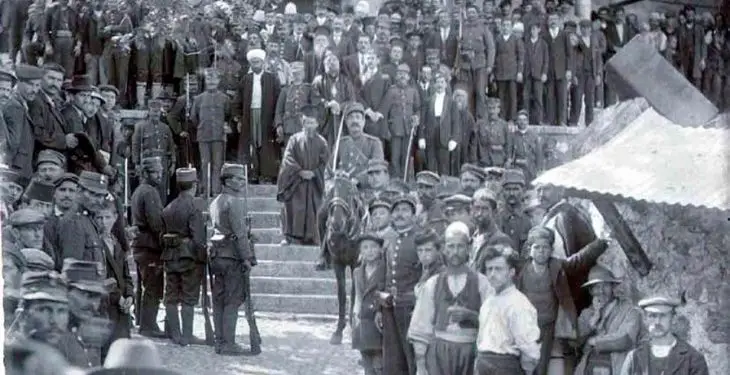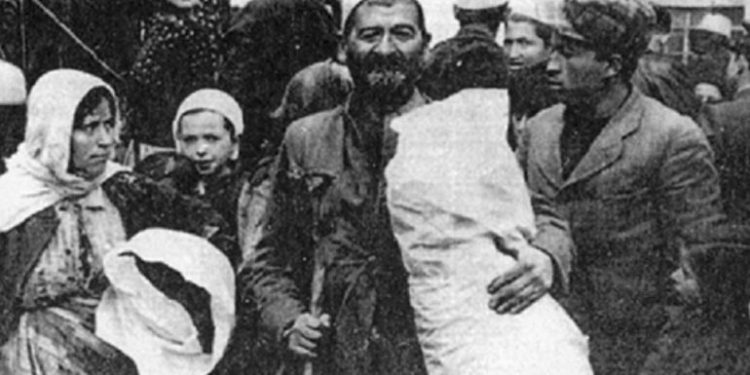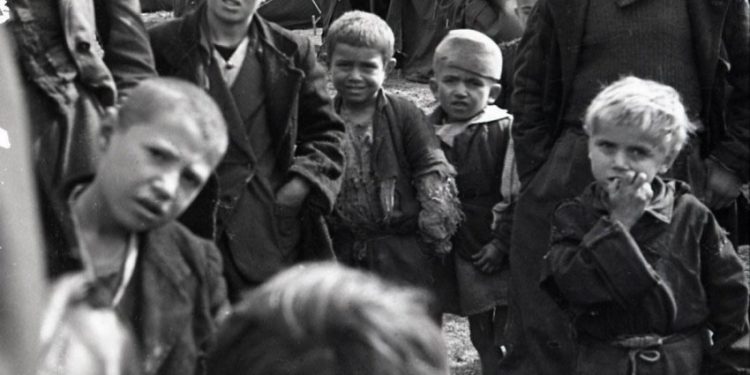By Enver Kushi
Memorie.al / I wrote the report “Stone and olive branch” (Mbresa na Çamëria) a few weeks after I returned from a quick visit to Çamëri and Spatar, the birthplace of my ancestors. It was my first visit to those places, where “Day is another day and night is another night” (Naim Frashëri). I remember that the next day after I returned to Tirana, I went to Rrogozhinë, to my parents’ house. In a bag I had a stone, an olive branch and some tapes with folk songs from Epirus, which I bought in the beautiful town of Gumenica. These were the only gifts for my father and mother.
As soon as I entered the kitchen, I hugged my parents and before sitting down, I took out of the bag the stone, the olive branch, the leaves of which were still fresh. Then I gave the stone to my father, and the olive branch to my mother. I was in Spatar, I said. I got both the stone and the olive branch there for you…! I will never forget that moment: at first the stupor, their surprised looks, as if they were waking up from a long sleep.
Very tall. The father kissed the stone. He kissed her several times and wept. He was a strong man and I had never seen tears in his eyes. Never. While I knew my mother’s tears. The mother also kissed the stone and returned it to the father, who couldn’t get enough of looking at it. The mother smelled the olive branch… They hadn’t seen Spatari, their hometown, for 45 years. I had brought them from far away, hundreds of kilometers away, the scents of childhood and youth.
The father passed away in mid-August 2000, while the mother died in late-April 2017. Their graves are close to each other, on a beautiful hill of Rrogozhina, and from there you can see the small town, the fields, the Shkumbin river, the waters of which quietly and lazily go to its estuary, the Adriatic. On the heads of their resting places, I put two small stones taken from my hometown, Spatari. The stone I received in August 1990, I have placed in a frame surrounded by the chain of my father’s pocket watch, the hands of which remained at four to five minutes, the moment he died.
I bring all this to the many readers of “Ex Libris”, with the reportage “Stone and olive branch” (Inspiration from Chameria), which is published in the framework of June 27, the Day of Remembrance, tragic Cham. Our great writer, Ismail Kadare, it is no coincidence that the preface of the Poetic Anthology “Eni vijen pej Çamërie”, written by Ali Podrimja, is titled “Pain that does not go away”. The genius of Albanian letters, in this preface, among others, writes: “Chameria is part of the most painful map of Europe, the one that has known displacement…! Most of the Chams, who were brutally displaced from their homes at the end of World War II, are still alive today.
Two or three generations have died out, those who barely made their way to Albania, but teenagers, children, finally, babies, who entered the mother country, in cradles, are alive. All of them, in one way or another, remember. No law of the world, no cultural formation, can make people not have memory, let alone not have nostalgia…! It’s a pain that doesn’t go away because someone outlaws it. Not even pretending to know. Even less, when you behave disrespectfully towards her…”! (February 28, 2004).
Jorgo Seferis, one of the greatest poets of neighboring Greece and the most famous and translated in the world, in the poem “Wherever I go” (translated by Ismail Kadare), has two excellent lines.
“Everywhere I go, I carry Greece with me
Like a wound.”
And if I were to paraphrase these verses, I would write:
“Wherever I go, I carry the Chamber with me,
Like a pain.”
Tirana, June 2023
THE STONE AND THE OLIVE BRANCH
Imprint from Chameria
On trips to the south of the country, as soon as I leave the Muzina Pass and look ahead, from where Ion’s space appears, I have constantly felt that my blood moves differently. And here, I said with myself the well-known line of the popular song: “I wish I were a bird and I could fly”! To fly towards those spaces. It has been more than a string, more than a desire, a perpetual torment, almost excruciating. In long winter nights, in thundering autumns (especially in the second autumn), this longing and longing slowly ate away at me.
Since I was little, I have heard dozens of stories about Çameria, Filati, Spatari (my parents’ hometown), Lopės, Gumenica, Grikohori, Paramthina, Suli, Parga, Preveza, the Kalamai river. Parents, relatives, at weddings and so on, strangers at casual meetings, remembered and still remember those places with unbridled longing. He remembers everything: the sea, the olive trees, the sheep, the houses, the dead and alive people, the roads they passed, the plateaus, the wells, the winds…! “Tie my sieves,” my mother often tells me, “And release me to the Neck of the World.” I find our place myself.
Even if it’s night…! That the stones know me and show me the path. The trees know me and speak to me, the graves know me…”! What is this strange place that had the sweetest bread, the tastiest meat, the softest stone, that was mentioned and mentioned so much with a corrosive longing? It is more than a longing, more than a pain, more than many things dear to man. I would experience this at the age of 40, on a special, unrepeatable day, during a chance trip to Çameri.
It was the beginning of August 1990, when after the shocking events of the embassies and the Tirana prison, one morning someone from the Opera and Ballet Theater congratulated me on the phone for the upcoming tour in South Italy. After a few hours, at noon, the dancer of the Ensemble of Songs and Dances, Bashkim Braho, while drinking coffee, would tell me privately: “We will go to Çameri. When we return, we will go to Filat and Spatar”. I put the coffee down and looked at the Union, as if I had suddenly woken up from a dream. He noticed my absence and repeated the words: “We will go to Çameri. We will go to Spatar”.
I broke up with him and during those days I thought I was really lucky. I didn’t tell anyone that. It was a secret that seemed to me that only I and the Union should know, that if I told anything to a third party, it could be destroyed as if by magic…! Even during the tour in Italy, we never spoke with the Union about the trip to Filat and Spatar. Only when the ferry, after a short stay in Corfu, moves towards the coast of Chameria, I almost cried out loud. It is a cool morning and a light gray mist has fallen over the mountain peaks and gentle hills of the Cham land.
It looks good Gumenica, built at the foot of the sea, Grikohori on a plateau with olives, Sajadha…! I wish I had their eyes, I said to myself. Mother’s eyes, father’s eyes and…!? What do you want, the friend next to me asked me? Nothing, I said. What about the eyes, he told me? I didn’t say anything, I said. You said something, he insisted. I heard you well. Maybe, I said. You said I had their eyes, he kept insisting. You said it out loud.
I wanted to tell him that I wanted my mother and father to be with me, to be those who were born near those shores, that with their stories, they had created and recreated hundreds of times in my imagination these places, that it seemed to me that they were waiting for me on the shores of the sea, that…! But I was silent. Even when I got down to Gumenica, I was silent. Even when I went out on the main streets, I was silent. The city had woken up in time and looked like it had been washed by the waters of the Ionian Sea. We go out on the main street of the city and suddenly someone walks in front of us.
– He is a friend of my family, – says Bashkimi.
The man in front of us, with his face baked by the sun, is no more than 45 years old.
– I’m Kastria, – he says in a beautiful Albanian.
– I’m glad to meet you, – I say.
– Will you come to us for lunch?
– Come for a snack – he insists. – We have a language, – he then adds.
Bashkimi tells me that they are housemates and that their parents used to come and go with each other.
– Stay safe in Gumenica, – he says. – You will make our hearts happy with your songs and dances.
Then we sit in a flower garden near the sea and he talks to us longingly about the Cham friends that his grandfather and father showed him, about the Cham blood that unites us, about the beautiful Cham villages. We part with him and with Beniamin Kruta and Bashkimi, we take the road to Filat and Spatar. Our companion occasionally talks to us about the villages we pass. Kalamai river and bridge. Its waters are cloudy from the recent rains. Then we pass through Vrsela e Galbaqi, leaving Varfanji on the left among the olive trees. We don’t stop at Filat. The road to Spatar is paved. Located on three beautiful hills, overlooking Filati, Spatari burned under the hot August sun.
We carefully look at the half-ruined houses, the planted gardens, the field of Lopës below and with hasty steps we go towards the neighborhood, which must surely be Bregu. where is our house I said to myself? What about the mother? And where are the Saqenja houses? I was like numb, with a dreamy confusion or a long lethargic sleep. I fixed everything: the olive trees, the houses, the ruin. where is the horse until I called out loud? The white horse that whinnied when, as I had heard, the house was surrounded in March 1945 and killed, after fighting for several hours Selman, my father’s uncle. He is being buried…?! Where are the graves? No one answered me. Stones and olives are sealed. Those who knew the stones and planted the olives, were not.
– See Corfu, – said Bashkimi.
– This is the Breg neighborhood, – I told him. – It looks like the sea. My uncles’ houses must have been here.
I approached the walls of a half-ruined house; I took a stone. I also plucked a branch from the nearby olive tree and some figs. And when we crossed the road that led to the center of the village, the dogs barked. In the center, at the door of a small shop, the shop owner waved at us and invited us to sit down. The Greek came short of body. I asked him where he was from. I’m not here, he said, serving us uzo and a plate of white cheese. He was from the villages of Ioannina. When we were going out, I asked him for two cups of tea. I want them as a keepsake, I told him. He handed us a bunch of tea. Just two strands of tea, I told him. I will give them a bunch, insisted the Greek. We thanked him for the hospitality.
Before we got into the car, I took one more look at the upper part of the village. It seemed lifeless…! Completely desolate, abandoned, vuv…! The three high hills with the ruined houses on them. The silence that prevailed everywhere, the August heat, added to his dumbness. Where’s the horse, I almost called again. The white horse, which neighed the night when Selman was killed, surrounded by Zervists. Where is his grave? What about other graves? … Where are the graves of my ancestors? Answer you, ruined houses. Where are the graves? Looking for graves…?! My dead I seek. Don’t hide them from me. Don’t hide my roots from me…! I’m looking for roots…! The roots…?!
Don’t hide my roots…! But… Spatari burned from the August sun, in his solitude. Suspended, like a thin mist, was the burning longing for those who had left him. And I don’t know why I remembered the words that Nuja, the daughter of the Mufti of Filat, often tells me: “The dream led me to your village…! Turn on the oven and bake bread…! And I gather Selamni, Emini, Zelua, Nesua, Fahrua…! And eat and eat cornbread with them. When I get sleepy, I look full. The dream leads me to your misty garden, then leads me to the great room. I open the window and see Corfu”.
With these imaginations we entered Filat, where we meet people who speak our language so beautifully.
– We know your cousins…! We had friendship with them.
– Say hello.
– Nephew of Xaviz? Your grandfather had a box…!
– Does Hiseni live? I knew Hiseni…!
– We see them in our dreams and talk to them…!
We see them in a dream…! For so many years we have been dreaming of houses, olive trees, roads, fields, graves, Çameri…! We leave Filati and take the road to Gumenica. Villages again…! Road to Paramithi…! The road to Preveza…! The way to…! In my hands I hold the stone and the olive branch I got in Spatar. Am I really in Chameri? Or maybe I’m dreaming…! The Chama land is scorched by the heat of August and seasonal birds fly over its spaces. Spatar’s stone warms my hands.
Filat-Tirana, August and third fall
(1990 Weather)




